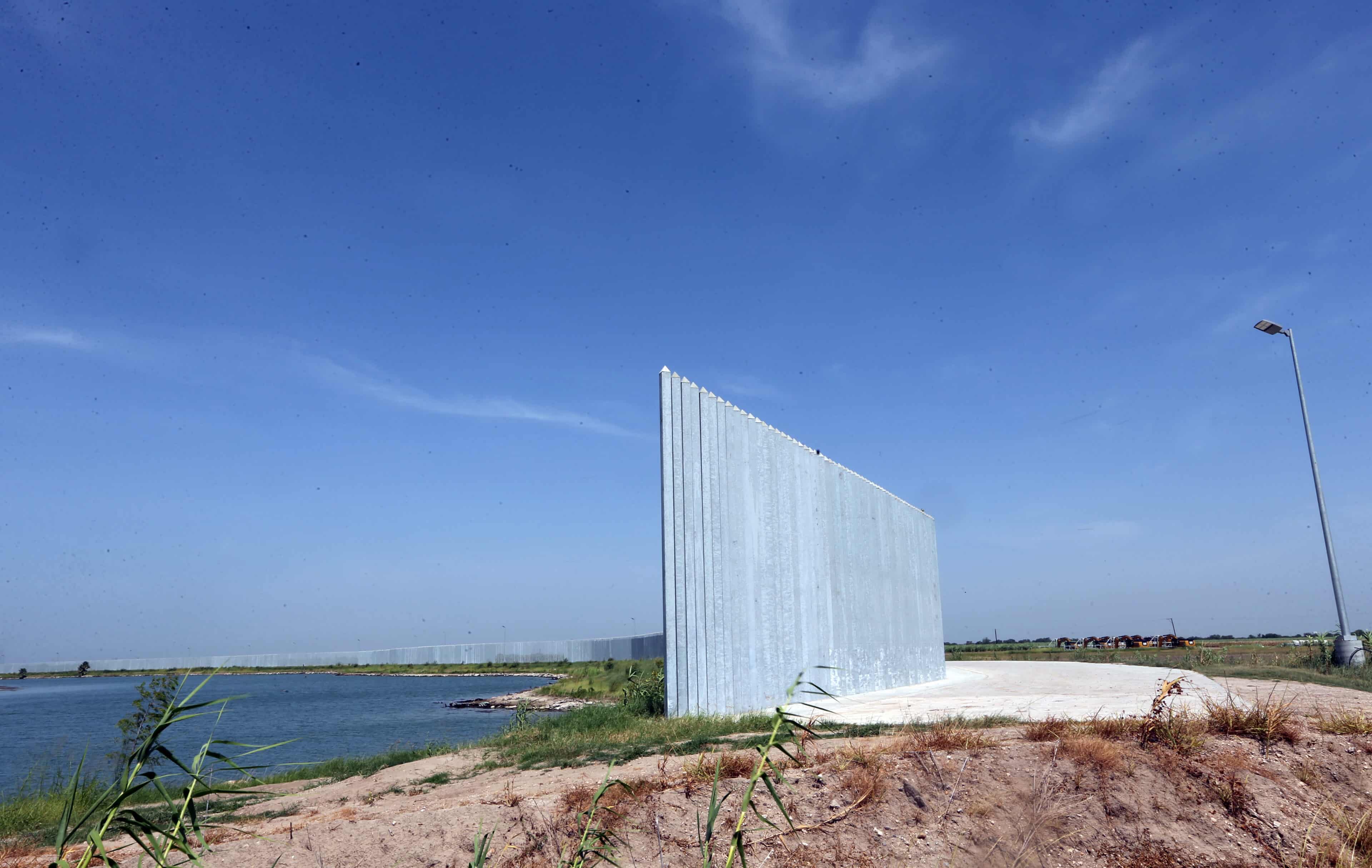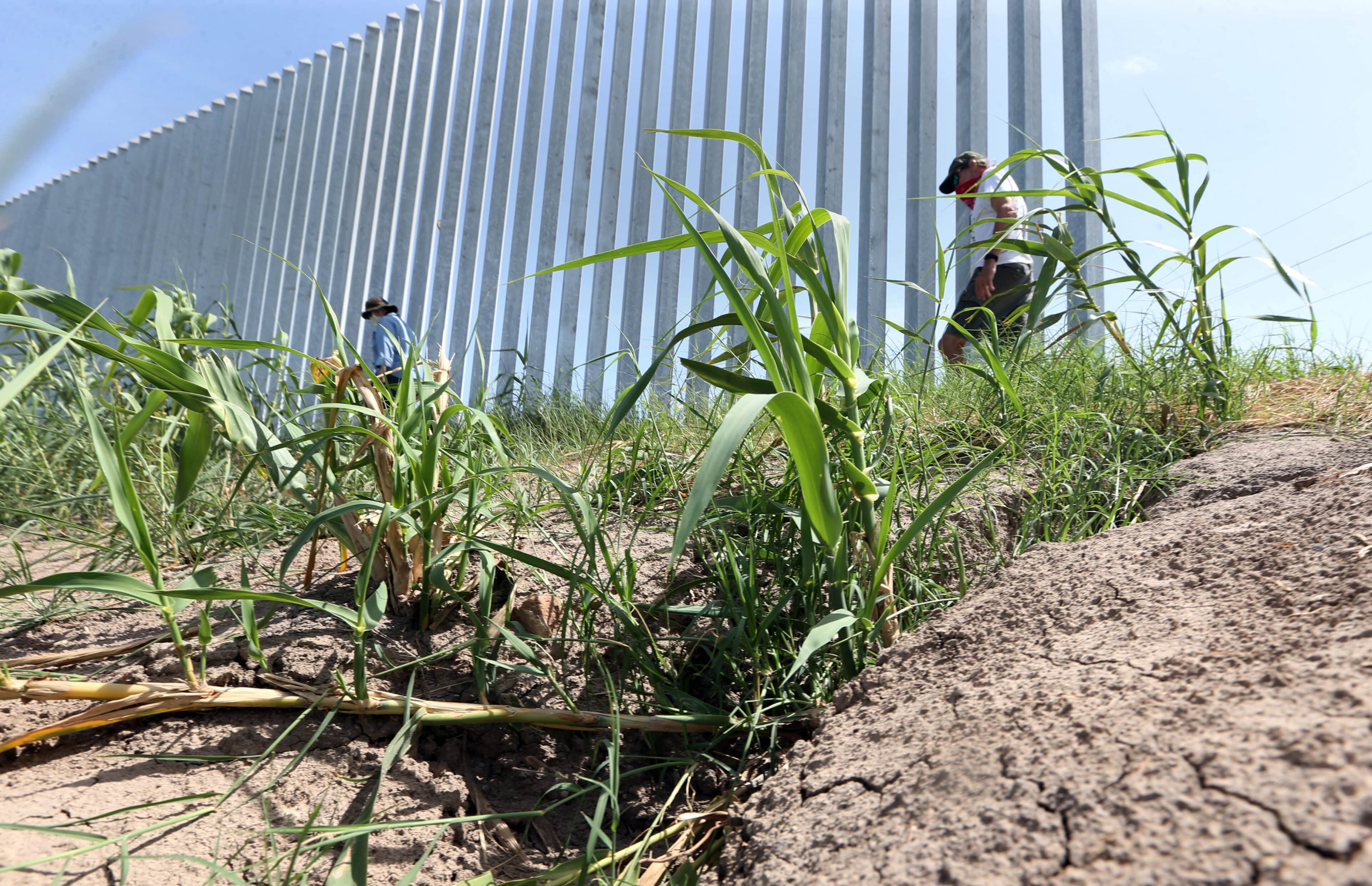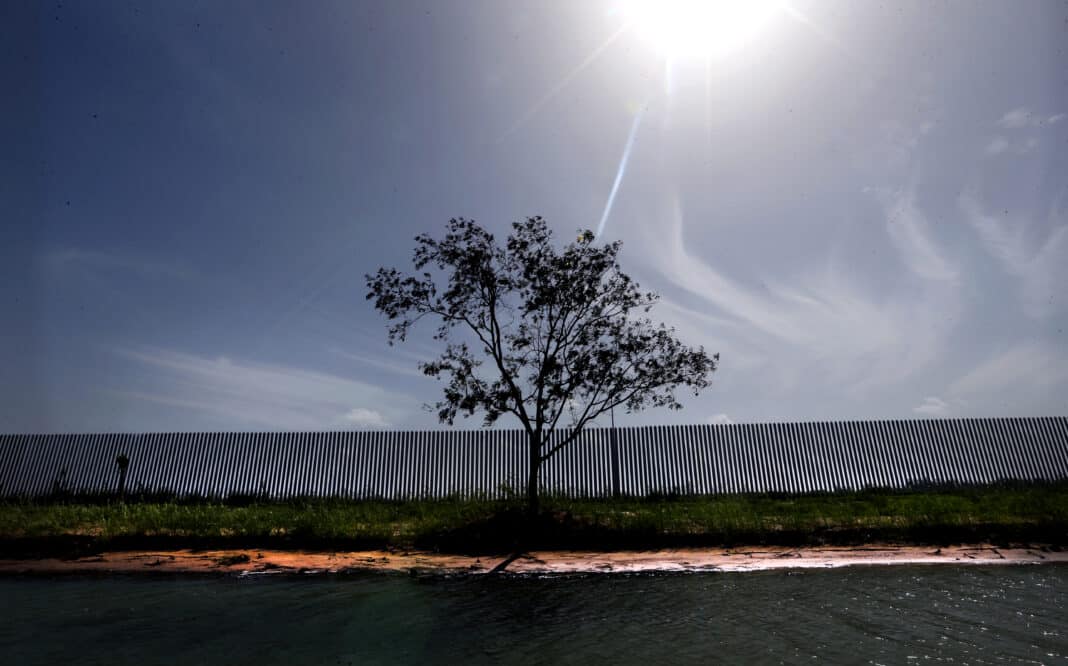The legal battles against a stretch of private border wall south of Mission remain stalled more than a year after two lawsuits were filed against its builders.
Progress in the pair of lawsuits — the first, filed by the National Butterfly Center, and the second filed by the federal government on behalf of the International Boundary and Water Commission — remains in a holding pattern after the three sides met Wednesday morning for another in what has become a long series of status conferences.
The hearing also revealed that, though one law firm wants out of the litigation, its lawyers must continue to represent their clients for at least a few more months.
“At this point, it’s just delay, delay, delay, delay, delay. And it’s getting very disheartening,” said Javier Peña, the attorney representing the butterfly center afterward.
In late November 2019, the butterfly center and its executive director, Marianna Treviño Wright, filed suit in state district court against the private wall’s builders: Fisher Industries and CEO Tommy Fisher, local landowners, Neuhaus and Sons, and the nonprofit fundraising organization, We Build the Wall, along with its founder Brian Kolfage.
Their suit alleged the 3-mile long wall’s construction, adjacent to the center’s land, would infringe upon its property rights.
Days later, the federal government filed a suit of its own, alleging that the project put the United States in violation of an international boundary treaty with Mexico — an assertion IBWC officials affirmed in findings last April.
Not long after the government filed its suit, the butterfly center’s lawsuit was transferred to federal court, where U.S. District Judge Randy Crane has held hearings on the two in tandem.
More than a year later, however, the wall stands finished. Yet, both lawsuits remain unresolved with no clear timeline forward.

The delays are due to myriad reasons, including attorneys from all three sides requesting more time from the court for various reasons, as well as the COVID-19 pandemic’s upending of courthouse operations throughout 2020.
Most recently, the butterfly center’s lawsuit has been stymied by a criminal case filed in New York.
There, federal prosecutors allege that Kolfage, along with Steve Bannon — once an adviser to former President Donald Trump — bilked millions from donors who gave money to We Build the Wall for the private wall-building efforts. Two others were also charged.
Prosecutors also froze the assets associated with the four men, including bank accounts belonging to We Build the Wall. As a result, the lawyers who have been representing the nonprofit in the civil lawsuits here have not been paid for their work since last August.
Those attorneys — David Oliveira, of McAllen, and Thomas Haskins, of Dallas — have since filed a request to withdraw their services.
But as Crane took up the matter Wednesday, their request was opposed by Kris Kobach, the former Kansas Secretary of State who now serves as We Build the Wall’s general counsel.
“If you read the motion in a vacuum, you’d say it seemed perfectly reasonable, but Mr. Haskins has neglected to inform the court of some very important information, and that is We Build the Wall has every intention of paying its legal fees, but is temporarily unable to do so,” Kobach said, addressing the court via phone.
Prior to Wednesday, the Kansas attorney had not made an appearance in McAllen since December 2019, when he successfully argued to have We Build the Wall and Brian Kolfage dropped as defendants in the government’s lawsuit. They remain defendants in the butterfly center’s case.
To bolster his argument, Kobach added that We Build the Wall hasn’t paid him either due to the asset forfeiture — something he has tried to reverse.
However, a New York federal judge in December denied Kobach’s request to lift the restraining order that froze We Build the Wall’s bank accounts, along with the nonprofit’s ability to pay his $25,000 per month retainer.
Kobach appealed the decision to the Second U.S. Circuit Court of Appeals, arguing that the nonprofit itself is not a named defendant in the criminal case, and disputing prosecutors’ allegations that all funds in those accounts were ill-gotten.
But, court records show that Kobach didn’t file his brief requesting the circuit court overturn the lower court’s decision until just two days before he made his comments in McAllen.

When pressed by the judge, Kobach admitted it could be as long as eight months before the circuit court renders its decision.
Crane, who has thus far been generous in accommodating requests for additional time, seemed equally willing to give Kobach the benefit of the doubt.
“While we’re having these Zoom hearings, these don’t take much lawyer time or preparation at all,” Crane said.
“I’m gonna withhold ruling on that, (and) carry it along just to see what happens in the other case,” he said of Oliveira’s and Haskins’ motion to withdraw as counsel.
Oliveira expressed his reservations about staying on the case while going unpaid.
“My concern is, if we start taking a lot of discovery and depositions, we’re going to go further into debt with no guarantee that we’re ever gonna get paid,” Oliveira said.
“I can’t continue to represent people for free, as much as I like Mr. Kobach, so we’re in a tough predicament,” he said.
Oliveira did not return a message seeking comment.
The issue also presents a predicament for the butterfly center, whose efforts to begin the discovery process have been put on ice for months as a result of We Build the Wall’s frozen assets.
Crane has limited what the center can request from We Build the Wall in order to limit the attorneys’ expenses while they remain unpaid.
Oliveira and Haskins also declined to sign off on a protective order that was signed by the other parties. The document would safeguard whatever materials are turned over in discovery.
They haven’t signed it, Oliveira said, because they expected to be allowed to withdraw from the case and didn’t want their actions to impact any attorneys who take We Build the Wall on as clients in the future.
Ultimately, the judge signed the protective order Thursday, making it applicable to all parties.
As Oliveira and Haskins wait for the judge to rule on their motion to withdraw, at least one of the defendants named in both suits is hoping to extricate themselves from the litigation entirely, as well.
Neuhaus and Sons, the landowners who provided the land where the 3-mile bollard fence was built, has finalized the sale of the ribbon of riverside terrain, their attorney, Lance Kirby confirmed Wednesday.
But that sale took more than a year to complete. Post-construction land surveys, and questions over who would pay the property taxes on the two parcels — which had ballooned in value thanks to the construction — delayed the ownership transfer.
With that transfer now complete, the judge asked the government’s attorneys if they were willing to drop Neuhaus from their suit, as they had We Build the Wall and Kolfage.
“If we could get a copy of those transfer documents and analyze them, we can make a decision at that point if the Neuhaus entity is still required,” said Assistant U.S. Attorney Eric Paxton Warner.
Whether the butterfly center is also willing to entertain that notion remains to be seen.
Unlike the government, which has repeatedly indicated it is seeking a “settlement posture” with the defendants, Peña said he and his clients continue to prepare for trial.
“If the government wants to allow them to keep up that wall in violation of the treaty, that’s the government’s prerogative,” Peña said.
“But in our case, we’re asking for damages. And as of now, up to this date, we haven’t seen any indication that settlement is even remotely possible from either side, so we’re getting ready for trial,” he said.
Both Peña and his client have less patience for the delays than the judge, however.
For Treviño Wright, the defendants’ delays over discovery, the land sale and other issues are part of a pattern of dishonesty meant to obfuscate potentially criminal action.
“It’s just a matter of how long is Judge Crane going to allow them to do that, and how long is he going to tolerate them to lie to his face?” she said.
“And please print that,” she added.
For Peña, the latitude given to the defendants in court strains credulity.
“I think it’s important that people know that the things these guys are getting away with — Fisher, We Build the Wall — are things that the courts would never let any of us get away with,” Peña said.
“They don’t have to follow the rules like we do,” he said.
The litigants will next meet in court on May 5.




